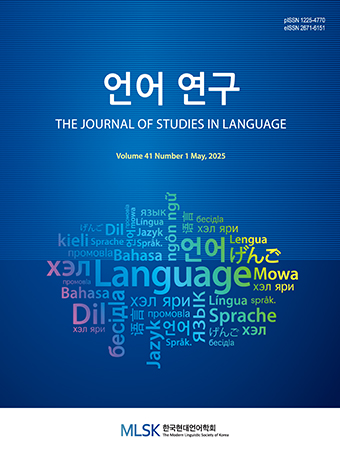Research Article
Abstract
References
Information
The current study aims to explore the effect of neologism usage on interpersonal communication, especially between students and instructors. A survey was conducted with 154 university students. The results show that the majority of students use neologisms very often, especially in text communication. The respondents feel intimacy when professors use newly coined words for communication. However, the professors’ use of neologisms does not affect interest and satisfaction of the class. Many respondents think the use of neologism is for the younger generation, therefore, when a professor communicates with a student using neologisms used by the student, it does not affect the formation of a positive relationship between the student and the professor. Many students expressed that if the instructor used the new word in an appropriate situation, it would positively affect communication with students and class time. This means that the use of neologisms should be used according to the utterance situation and the utterance context.
- 강현석, 강희숙, 박경래, 박용한, 백경숙, 서경희, 양명희, 이정복, 조태린, 허재영. 2014. 사회언어학: 언어와 사회, 그리고 문화. 서울: 글로벌콘텐츠.
- 곽면선. 2019. SNS 커뮤니케이션에서 영어와 한국어에 나타난 세대 간 언어의 격차 분석: 화용론적 관점에서. 언어연구, 35.2, 161-183. 10.18627/jslg.35.2.201908.161
- 교육부 국민서포터즈. 2020. 학생 언어 인식 개선을 위한 창의적 체험활동 수업. https://if-blog.tistory.com/11120.
- 김정기. 2012. 커뮤니케이션 스타일, 동기, 주목도, 만족감, 교육효과의 관계. 한국소통학보, 18, 202-234.
- 박선희. 2016. 한국인 대학생과 중국인 유학생의 준말 사용. 학습자중심교과교육연구, 16.1, 21-40.
- 서재원, 곽선영, 임종훈, 송관수, 나예빈, 신선경. 2020. 대학생 모바일 커뮤니티 사용이 대인관계에 미치는 영향. 사회복지비전연구, 8, 135-178.
- 양승천, 강미은, 도준호 (역). 2002. 매스커뮤니케이션 이론. McQuail, D.의 Mass Communication Theory. 1983. 서울: 나남출판.
- 오택섭, 강현두, 최정호. 2006. 미디어와 정보사회. 파주: 나남출판.
- 이정복. 2011. 인터넷 통신 언어 실태와 세대 간 의사소통의 문제. 배달말, 49, 29-69.
- 이주미, 이연정. 2022. 대학 학부 신입생의 한국어 신조어 사용 인식에 대한 연구. 인문사회21, 13.2, 1427-1442. 10.22143/HSS21.13.2.101
- 이창덕. 2003. 교사 화법 연구와 교육의 필요성과 그 과제. 화법연구, 5, 9-48.
- 임규홍. 2000. 컴퓨터 통신언어에 대하여. 배달말, 27, 23-59. 10.1080/08882746.2000.11430445
- 정일권, 김은미, 백영민. 2014. 인터넷 이용과 커뮤니케이션 규범 변화의 관계에 관한 연구. 한국언론학보, 58.3, 283-312.
- 조윤경. 2017. 교수자 커뮤니케이션 스타일이 학습동기와 교육만족에 미치는 영향에 관한 연구 - 대전광역시 자격증 취득 학습자를 중심으로. 박사학위논문, 목원대학교 대학원.
- 조윤경. 2021. 대학 실시간 원격수업에서 교수자 커뮤니케이션이 학습 실재감에 미치는 영향. 한국교육, 48.3, 25-48.
- 허영주. 2009. 교사 유머의 교육적 효과와 성공적 활용의 조건 및 전략 탐색. 교육방법연구, 21.1, 115-139.
- 홍정기. 2009. 교수, 학습에서 일어나는 의사소통 불일치 현상의 이론적 고찰. 교육과정평가연구, 9.1, 23-42. 10.29221/jce.2006.9.1.23
- Barker, V. 2012. A Generational Comparison of Social Networking Site Use: The Influence of Age and Social Identity. International Journal of Aging and Human Development 74, 163-189. 10.2190/AG.74.2.d 22808625
- Burgoon, J. K. and Hale, J. L. 1988. Nonverbal expectancy violations: Model elaboration and application to immediacy behaviors. Communication Monographs 55.1, 58-79. 10.1080/03637758809376158
- Christensen, L. J. and Menzel, K. E. 1998. The linear relationship between student reports of teacher immediacy behaviors and perceptions of state motivation, and of cognitive, affective, and behavioral learning. Communication Education 47.1, 82-90. 10.1080/03634529809379112
- Crystal, D. 2008. Txting: The Gr8 Dn8, Cambridge: Cambridge University Press.
- Dansieh, S. A. 2008. SMS testing and its potential impacts on students’ written. International Journal of English Linguistics 223.1, 222-229.
- Frymier, A. B. and Houser, M. L. 2000. The teacher-student relationship as an interpersonal relationship. Communication Education 49, 207-219. 10.1080/03634520009379209
- Goldman, Z. W. and Goodboy, A. K. 2014. Making students feel better: Examining the relationships between teacher confirmation and college students’ emotional outcomes. Communication Education 63.3, 259-277. 10.1080/03634523.2014.920091
- Goodboy, A. K. and Myers, S. A. 2008. The effect of teacher confirmation on student communication and learning outcomes. Communication Education 57, 153-179. 10.1080/03634520701787777
- Gorham, J. 1988. The relationship between verbal teacher immediacy behaviors and student learning. Communication Education 37.1, 40-53. 10.1080/03634528809378702
- Mottet, T. P. and Beebe, S. A. 2006. Foundations of instructional communication. In T. P. Mottet, V. P. Richmond, and J. C. McCroskey (eds.), Handbook of instructional communication: Rhetorical and relational perspectives. Boston: Allyn and Bacon, 3-32.
- Mottet, T. P., Richmond, V. P., and McCroskey, J. C. 2006. Assessing instructional communication. In T. P. Mottet, V. P. Richmond and J. C. McCroskey (eds.), Handbook of instructional communication: Rhetorical and relational perspectives. Boston, MA: Allyn and Bacon, 283-307.
- Sperber, D. and Wilson, D. 1995. Relevance: Communication and Cognition. Oxford: Blackwell.
- Publisher :The Modern Linguistic Society of Korea
- Publisher(Ko) :한국현대언어학회
- Journal Title :The Journal of Studies in Language
- Journal Title(Ko) :언어연구
- Volume : 38
- No :3
- Pages :259-274
- DOI :https://doi.org/10.18627/jslg.38.3.202211.259




 The Journal of Studies in Language
The Journal of Studies in Language






